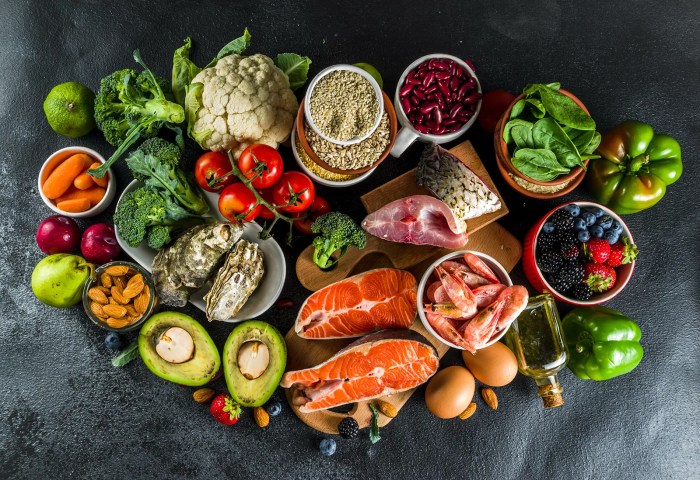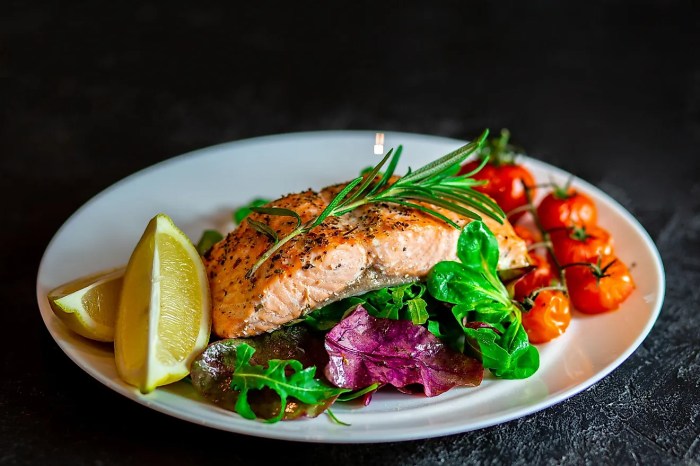Embarking on a pescatarian life offers a harmonious blend of health, environmental consciousness, and cultural exploration. By embracing a diet centered around seafood while excluding other animal meats, pescatarians reap the benefits of a balanced and sustainable lifestyle.
This comprehensive guide delves into the principles, nutritional implications, environmental impact, cultural aspects, and culinary delights of pescatarianism. Whether you’re considering adopting this dietary approach or simply curious about its nuances, join us as we navigate the multifaceted world of pescatarian life.
Health Implications

A pescatarian diet has been associated with numerous health benefits, primarily due to its focus on fish consumption. Fish is a rich source of omega-3 fatty acids, which have been shown to reduce inflammation and improve cardiovascular health.
Studies have linked a pescatarian diet to a lower risk of heart disease, stroke, and certain types of cancer, including prostate, colorectal, and lung cancer. The antioxidants and anti-inflammatory compounds found in fish are believed to play a role in these protective effects.
Potential Health Concerns and Nutrient Deficiencies
While a pescatarian diet offers many health benefits, it’s important to be aware of potential health concerns and nutrient deficiencies that may arise. One concern is the risk of mercury exposure from consuming certain types of fish, such as tuna and swordfish.
Another potential concern is the lack of vitamin B12 in a pescatarian diet. Vitamin B12 is primarily found in animal products, so pescatarians who do not consume eggs or dairy products may need to supplement or consume fortified foods to ensure adequate intake.
Addressing Concerns and Nutrient Deficiencies
To address the potential health concerns associated with a pescatarian diet, it’s recommended to:
- Choose fish low in mercury, such as salmon, sardines, and mackerel.
- Limit consumption of fish high in mercury, such as tuna and swordfish.
- Supplement with vitamin B12 or consume fortified foods, such as cereals and plant-based milk.
Environmental Impact
Pescatarianism offers significant environmental advantages compared to other dietary patterns, particularly in terms of reduced greenhouse gas emissions and preservation of marine ecosystems.A study published in the journal Environmental Research Lettersfound that a pescatarian diet emits 46% less greenhouse gases than a typical Western diet.
This is primarily due to the lower consumption of red meat and poultry, which have a higher carbon footprint than seafood.
Sustainability of Seafood Consumption
While seafood is generally considered a sustainable protein source, it is crucial to make informed choices to minimize the environmental impact of our consumption. Overfishing, habitat destruction, and pollution pose threats to marine ecosystems.* Choose sustainable seafood options:Look for seafood certified by organizations such as the Marine Stewardship Council (MSC) or the Aquaculture Stewardship Council (ASC), which ensure responsible fishing practices and minimize environmental harm.
Reduce consumption of overfished species
Avoid consuming species that are listed as overfished or endangered, such as bluefin tuna, Chilean sea bass, and orange roughy.
Support local fisheries
Buying seafood from local fishermen helps reduce transportation emissions and supports sustainable practices.
Embracing a pescatarian diet offers a unique culinary experience that combines the benefits of both vegetarian and seafood-based diets. This semi-vegetarian approach involves excluding all meat and poultry while embracing a wide array of seafood options, including fish, shellfish, and crustaceans.
By incorporating the nutritional value of seafood, pescatarians can enjoy a balanced and protein-rich diet while still minimizing their environmental impact.
Ethical Considerations
Pescatarianism raises ethical concerns regarding the treatment of fish. Some individuals may question the ethical implications of consuming animals, even if they are not considered sentient like mammals.* Humane fishing methods:Choose seafood caught using methods that minimize harm to fish, such as hook-and-line fishing or traps.
Bycatch reduction
Embracing a pescatarian diet offers a unique blend of health benefits and culinary delights. This dietary approach excludes meat and poultry, while incorporating fish and other seafood as the primary source of protein. By combining the nutritional richness of seafood with plant-based foods, pescatarianism promotes cardiovascular health, supports cognitive function, and fosters a healthier overall well-being.
Support fishing practices that minimize bycatch, which is the unintentional capture of non-target species.
Respect for marine ecosystems
Recognize the interconnectedness of marine ecosystems and the importance of preserving their biodiversity.
Cultural Aspects
Pescatarianism, a dietary practice involving the consumption of fish and other seafood while abstaining from meat, has been influenced by cultural and religious beliefs throughout history. This dietary practice holds significant cultural and religious significance in various regions of the world, shaping culinary traditions and impacting social interactions.
In many cultures, religious observances have played a pivotal role in the adoption of pescatarianism. For instance, in certain branches of Buddhism, the avoidance of meat consumption is considered a virtue, leading to the widespread adoption of pescatarian diets among Buddhist communities.
Role in Cuisines
Pescatarianism has left an indelible mark on global cuisines, with traditional dishes showcasing the culinary versatility of seafood. In Mediterranean countries like Greece and Italy, pescatarian dishes are a staple, featuring fresh seafood grilled, baked, or incorporated into flavorful stews and soups.
Similarly, in Japan, sushi and sashimi are iconic pescatarian delicacies, showcasing the country’s culinary prowess in seafood preparation.
Cultural Challenges
Despite its cultural and religious significance, adopting a pescatarian lifestyle may present certain challenges in some societies. In regions where meat consumption is deeply ingrained in cultural practices and social gatherings, pescatarians may face social pressure or limited dining options.
Additionally, access to affordable and diverse seafood can be a challenge in certain areas, further hindering the widespread adoption of pescatarianism.
Recipe Ideas and Meal Planning

Adopting a pescatarian diet opens up a world of culinary possibilities that emphasize seafood and plant-based ingredients. Meal planning becomes a creative adventure, ensuring nutritional balance and variety.
Breakfast, Pescatarian life
- Scrambled eggs with smoked salmon and avocado
- Oatmeal with berries and nuts, topped with grilled fish
- Whole-wheat toast with tuna salad and cucumber
Lunch
- Grilled salmon salad with mixed greens, quinoa, and roasted vegetables
- Tuna sandwich on whole-wheat bread with hummus and sprouts
- Lentil soup with a side of grilled shrimp
Dinner
- Baked tilapia with roasted vegetables and brown rice
- Pasta with seafood marinara sauce
- Grilled salmon with quinoa and steamed broccoli
Snacks
- Trail mix with nuts, seeds, and dried fruit
- Hummus with vegetable sticks
- Yogurt with berries and granola
Closing Summary

In conclusion, the pescatarian lifestyle emerges as a well-rounded choice that nourishes the body, respects the environment, and honors cultural traditions. While careful planning is essential to ensure nutritional adequacy, the health benefits, environmental advantages, and culinary diversity make pescatarianism an attractive option for those seeking a balanced and sustainable way of life.
FAQ Summary: Pescatarian Life
Is a pescatarian diet restrictive?
While pescatarians exclude animal meats, they enjoy a wide variety of seafood, fruits, vegetables, whole grains, and plant-based proteins, making it a diverse and nutritious diet.
Are there any health risks associated with a pescatarian diet?
As with any diet, careful planning is crucial. Pescatarians should pay attention to vitamin B12, iron, and omega-3 fatty acid intake, ensuring adequate levels through dietary choices or supplementation.
How can I incorporate seafood into my pescatarian meals?
Seafood can be incorporated in various ways: grilled salmon with roasted vegetables, tuna salad sandwiches, shrimp tacos, or vegetarian sushi rolls with added fish.